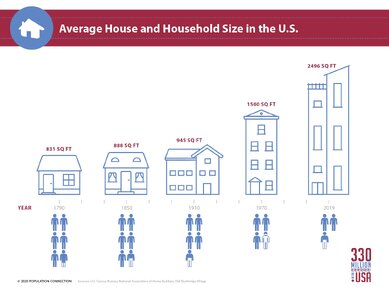There's always a lot of infill and teardown both individually and collectively as well as rezoning to relieve some of the pressure to move farther out. Those tend to be the least well to do who can't afford urban land price and settle for smaller , less desirable land and the most well to do who want larger , more private areas.
Technology and homes as status symbols have gone hand in hand. Engineered materials and heavy equipment make larger homes easier to build. Better insulation, heating ,lighting and make them cheaper effectively to keep livable and maintain. The increase of work from home, in home entertainment takes space. The more efficient kitchens, freezers, washers , dryers also are larger and take up more space. Having and not having any of these affect both you social status and your feelings about yourself. That ends up with ,in many cases, house sizes substituting for lot sizes.
There are some things to consider , though. Quite a bit of the impetus to create this sort of home environment and the costs of it are mitigated in the time and money that you spend on the outside world. That seems like a very personal judgment about what that's worth

